A year on – look at the Nanning bears now
03 June 2015

See also: "The best year of their lives - but we need to make it better"
April marked a year since Animals Asia took on its greatest challenge, carrying out the world’s biggest ever bear rescue and saving 132 bears from the bile industry.
Those bears have had their lives completely transformed in the last 12 months and have undoubtedly just experienced the greatest year of their lives.
When the facility was functioning for profit, the bears were a commodity. Stored like stock and bred to increase productivity. No thought was given to the welfare needs of these sentient beings so capable of suffering.
But since Animals Asia took on the running of the facility, their welfare became the number one priority, and the bears have certainly noticed the difference.
Animals Asia founder and CEO, Jill Robinson MBE said:
“The basic facilities remain, but the atmosphere of Nanning is utterly changed. Walking into the sheds used to be a truly upsetting experience as terrified, hungry, traumatised bears would stereotype wildly, let out heart wrenching moans, or jump in terror when we came near. Many of them were surrounded by their own faeces and filth, unbearably hot with no access to water.
“But now it is so different here. The bears are calmer, healthier and clearly have meaning to their lives. It’s wonderful to see them so bright and curious, and to see what a difference a year has made.”
Simple, effective enrichment items are keeping the body and mind of each bear active, benefitting their physical and psychological health.
Bamboo feeders, Kong toys, paddling pools, fruit ice blocks, browse and regular showers are just some of the ways the bears are enjoying spending their days.
In addition each bear is finally free of pain after all 73 adult bears received full health checks.
These bears had never before received medical care and many were suffering from seriously painful conditions. Sadly eight bears have died but it’s a figure that vets expected to be higher considering the conditions the bears were previously living in and the lack of vet care.
Emily Drayton, Animals Asia Resident Veterinarian said:
“Health checking so many bears in facilities that were never meant to provide such care was incredibly challenging. But most difficult was being faced by such a vast number of debilitating issues. So many bears were suffering from hugely painful dental issues that required extensive surgery, while others had problems with their eyes and skin. Cancerous tumors were a constant concern as the bears’ internal organs had been ravaged by bear bile extraction.”
Free of pain, thirst and hunger, the bears are visually so much happier. A healthy diet of fruit and vegetables over the last year means coats are thicker and glossier, while bellies are fuller and rounder.
The proof of the bears’ improved welfare is evidenced in emerging play behaviours. Juveniles housed together would previously fight over scant food supplies while adults were lethargic and disinterested having been worn down by empty lifetimes of solitary drudgery.
Now, the adult bears cool off in their paddling pools, splashing playfully or gleefully lying on their backs to have their stomachs showered. The juveniles too – now importantly separated into same sex pairs – have begun to form much more meaningful relationships and wrestle playfully.
The separation of mixed sex pairs means no bear will ever again be born into a life of captivity on the site.
Meanwhile, Smudge – last bear to be bred here – has been introduced to a moon bear friend. A landmark meeting as it is the first time she has ever interacted with another bear.
Smudge’s new companion is a three-year-old female who has been affectionately nicknamed “JieJie” (big sister).
While Smudge had never known the company of other bears, with each passing day her confidence grows as she bonds with JieJie.
Animals Asia’s China Bear and Vet Team Director Nicola Field said:
“Smudge has been such a symbol for what we’re trying to achieve in Nanning. Born just as the facility was handed over to us, she is incredibly fortunate in that she will never have to know the agony of life on a working bear bile farm. But she also represents what a massive commitment and challenge this is. It’s 124 bears for the rest of their lives. In Smudge’s case that could be 30 years, however, we’re here for the long haul.”
While great progress has been in improving the daily lives and wellbeing of the bears, there is much more to come.
Life-giving water lets hope flourish for rescued Nanning moon bears
When Animals Asia took over management of the Nanning Bear Farm even the most fundamental element of life – water, was in short supply.
Broken pumps meant that the water supply to the bear houses was infrequent at best. Often there would be no water for days.
For the bears it meant unbearably hot tropical days with rationed drinking water and walking round rancidly dirty concrete pens.
Thankfully, Animals Asia was able to install new, efficient pumps which provided water to the facility around the clock.

For the bears, the contrast changed everything.
Constant access to drinking water allowed them to quench their thirst, while staff would regularly visit them to deliver much-loved cooling showers.
But more was yet to come. Soon bears were regularly receiving fruit ice blocks and each den had a paddling pool installed so bears could soak in cold water whenever the heat became too much. These pools and ice blocks were hugely stimulating to the bears giving them much needed entertainment.
The water also improved hygiene and sanitation on site as power hoses allowed the team to clean away decades of filth from the bears’ enclosures.
Animals Asia founder and CEO, Jill Robinson MBE said:
“One of the greatest changes in the lives of the Nanning bears was perhaps, quite simply water – the essential ingredient of life. From hygiene to comfort to entertainment, having a stable supply was incredibly important to improving welfare. The entire organisation is indebted to Miomojo who generously funded the construction work that was so important in providing improved quality of life to each and every bear on site.”
BACK
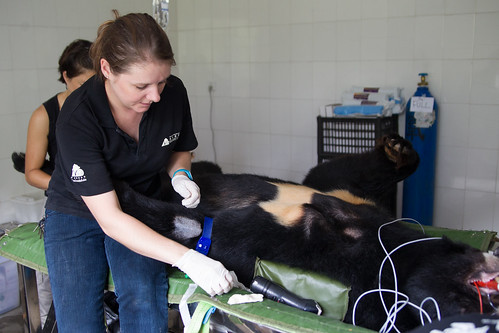
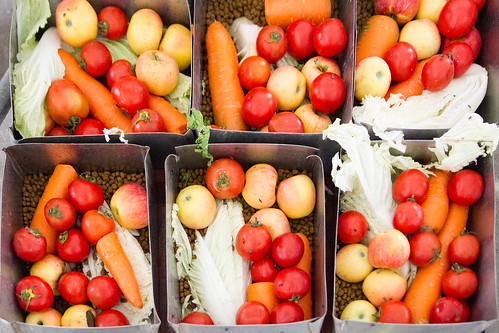
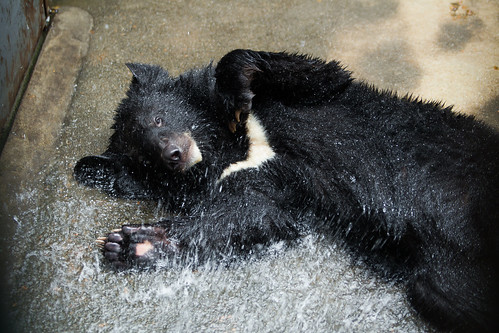
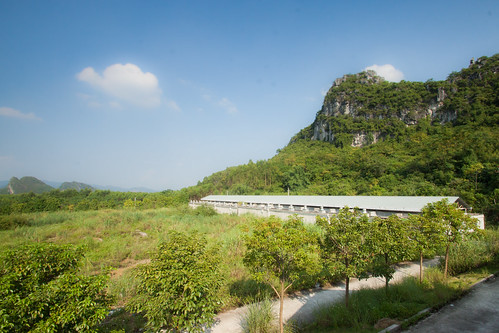
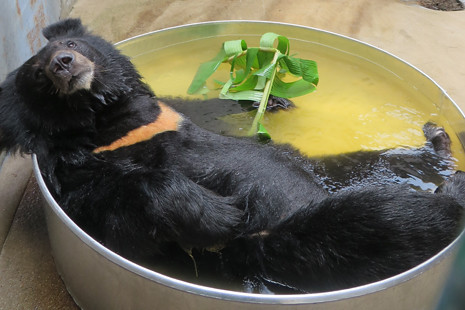




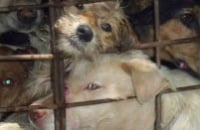 5 reasons the dog meat trade must end
5 reasons the dog meat trade must end
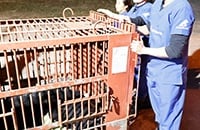 New year, new home for Christmas the Bear!
New year, new home for Christmas the Bear!
 Veterinary welfare training – pain management
Veterinary welfare training – pain management